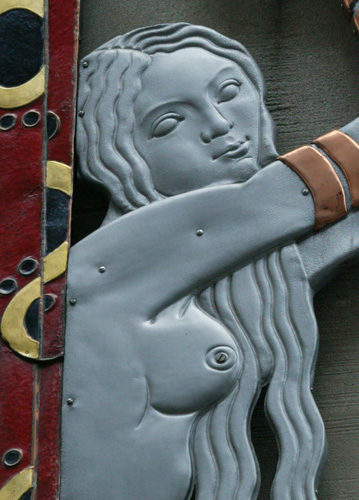I only play a doctor on TV
So, those magnum Jupiter brains at Crispin Porter + Bogusky managed to crap the bed with their Microsoft ads instead of making Microsoft cool. For some reason this made me remember these three factoids:
According to Wikipedia, PC Guy John “PC” Hodgman is a Mac user, and Justin “Mac” Long is computer illiterate.
“Kazuo Kawasaki, the Japanese designer for Sarah Palin’s glasses, is grateful to the Republican vice presidential candidate for making his product famous, although he acknowledged he also likes Democratic presidential hopeful Sen. Barack Obama“. Palin’s frames without lenses cost as much as John Edward’s haircut.
I’ve read somewhere that Norm Abram hates plaid shirts. A person who worked for the show told me that his shirts are mostly from Land’s End, by the way.
I don’t know, I guess this is how my puny Pluto brain works…
Beyond Fusion: A New Look at Ethnic Influences on Contemporary Cooking
In this timely book for contemporary cooks, Rainer Zinngrebe demonstrates his easy expertise in the often-misinterpreted field of fusion cuisine. He shows us how to do it properly, going beyond the ususal Pan-Asian themes and drawing on his classical European background and extensive experience in Asia and the USA.
Deadprogrammer visits Odessa : Part I : Introduction
I live on a high floor of an art deco tower facing a busy Brooklyn street. The acoustics of the building and the street are such that I can sometimes hear what’s going on in the street right from my desk. Once I heard the sounds of a minor fender bender followed by an angry exchange unpleasantness that was escalating into some creative Russian profanity. The driver who rammed the other car was pretty unapologetic and criticized the driving skills of the one who got rammed. Then followed the exchange that made me laugh out loud – the driver who got rammed said – “the way you behave, man, you must be from Odessa.” “Yes, I am,” – answered the other guy, and added – “and you still drive like a moron.”
Odessa, Ukraine, my hometown, is a very special place. It has a Bizarro mirror twin, Odessa, Texas.
Odessa is a resort town situated on the shore of the Black Sea, right across from Turkey. Culturally it’s a bit like Brooklyn (or Brooklyn is a bit like Odessa because of an almost constant infusion of Odessans) – a city with an attitude, a city where a lot of famous people are born and famous people come to live. Architecturally it’s a lot like Vienna and St. Petersburg: a city built on a grand scale (but with softer edges), by the best architects.
Odessa’s ancient past is obscure: a Greek colony, a small town controlled by Kievan Rus, the Golden Horde, various Khanates and Kaganates, and finally a Turkish fortress. Odessa’s fortunes have turned when Russian forces invaded it in late 1700s. Catherine the Great apparently wanted to fortify the newly won land, and committed the people and resources needed to make the new city of Odessa a success.
The founding fathers of Odessa were a bunch of distinguished foreigners in the service of the Russian crown: General José Pascual Domingo de Ribas y Boyons, Armand Emmanuel Sophie Septemanie du Plessis, duc de Richelieu, and Count Louis Alexandre Andrault de Langéron.
Richelieu, or the Duc, as he’s commonly known in Odessa, will forever be loved by Odessans for his accomplishments. The way I imagine the Duc is sort of like the 18th century Steve Jobs, with a reality distortion field of his own, except without being an asshole (Richelieu was known for his kindness and indifference to money). Somehow – nobody know exactly how – Richelieu got Odessa the status of a “free port“. This meant that goods could be unloaded without paying the taxes within the city limit. This brought about an unprecedented influx of wealth, which in turn fueled the building of Odessa by the best European architects in the European manner. Odessa’s opera theater is only slightly smaller than Vienna’s, and is by the same architect.
Another unique aspect of this new city was the ethnic makeup. Besides the usual for Ukrainian cities mix of Ukrainians and Russians, Odessa became a melting pot. Frenchmen, Greeks, Turks, Germans, Armenians: all rushed into Odessa. Even the Jews were allowed in, and not being limited to certain occupations or living in a ghetto. Odessa is a very Jewish town despite what the author of Everything Is Illuminated might have you believe.
I left Odessa when I was 16. I came back for a 10 day visit 15 years later.
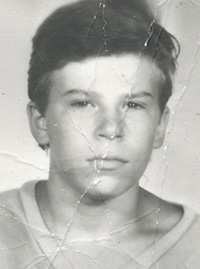
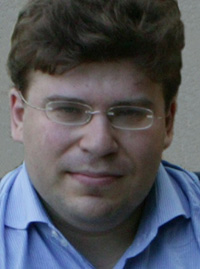
Odessa is a a city that makes you nostalgic, and I kept seeing it in my dreams. Luckily there’s a small international airport in Odessa and President Yushchenko kindly lets the holders of an American passport into the country freely, with no need for a visa.
12 hours and $1300 later I was standing in Odessa, looking for a cab. A pushy cabby was very surprised when I did not want to ride in his clean BMW and chose a cheaper and dearer to my heart filthy Soviet-vintage car.
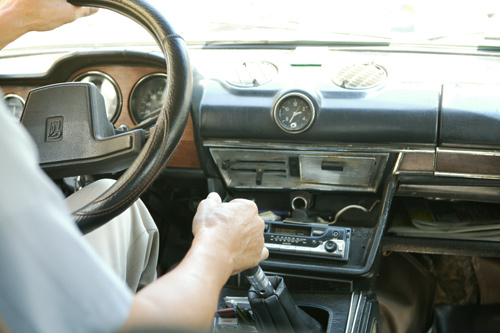
As far as hotels go, Ukraine is much more reasonable than Russia, but there are still no Marriott-like affordable and well-designed chains. There are overpriced hotels with decor that will burn your eyes out, cheaper, but scarier hotels, and apartments that you can rent which cover the gamut. Odessa has a population of about a million, but it swells to twice the size in the Summer season. Because of that there are thousands of very reasonably priced rental apartments with great amenities. Unfortunately I did not plan enough ahead, and ended up reserving a very cheap room in a brand new hotel Zirka that recently opened right in the center of the city.
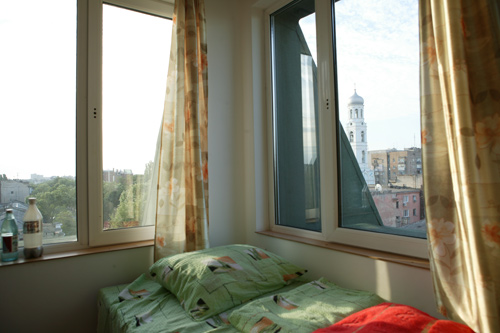
For a very reasonable $35/night I lived in a tiny-tiny, somewhat flimsily outfitted, but very clean room with a fully functioning shower, air conditioning and beautiful views, right in the historic center of Odessa.
The hotel was still being built when I lived there, and I herd later that it was becoming a bit notorious for renting the rooms at hourly rates.
As far as I’m concerned, you really can’t beat their amenities, their location, and their prices. Also, the staff was very courteous and professional. It was very quiet there during my stay – but worst case scenario – you might overhear noisy sex, from which you are not guaranteed at almost any hotel.
It’s hard to see on picture, but the towels had little dollar sign designs.
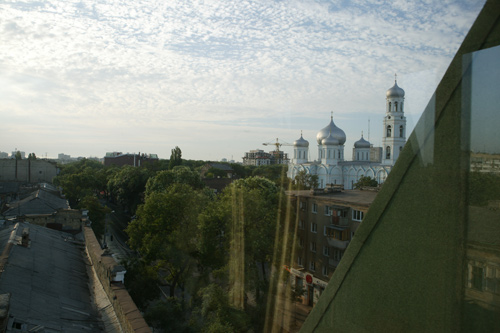
My hotel room reminded me very much of the affordable hotel room that I lived in in Japan, down to the picture of soft drinks that I took there.
In Odessa I mostly drank Borjomi, a Georgian mineral water. Borjomi, as far as I’m concerned is the tastiest mineral water in the world.
Odessa has its own mineral water, Kuyalnik, but it’s not sold in restaurants for some reason. I found a few bottles in a convenience store closer to the end of my stay. More about Kuyalnik later – I have a very special connection to it.
Apparently in Europe Diet Coke is marketed as Coca Cola Light, is sold in frosted bottles, and as far as I can tell, in a different formulation. It did taste different, and I know my cokes.
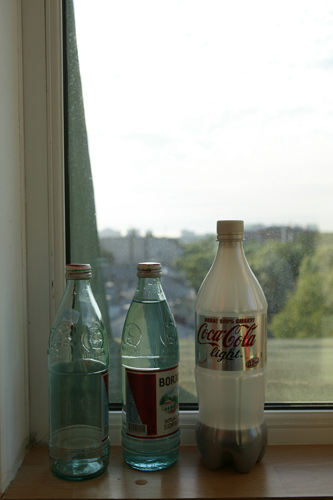
I quickly unpacked, grabbed my camera and went for a walk.
You really can’t enter the same river twice. I left Odessa when the Soviet Union was still intact. When I came back, a lot of things stayed the same.
There’s still a fountain in the City Square, the live band is still playing on Sundays and the pairs still dance.
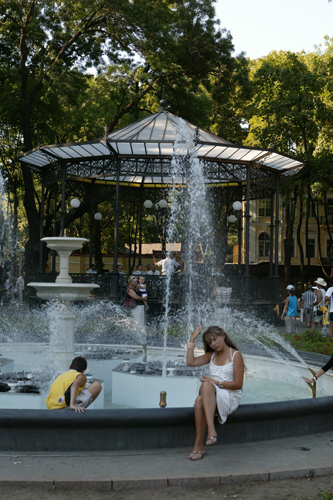
Acacia trees, the most common plant and the symbol of Odessa, are still filling the city with the aroma and sidewalks with their yellow flowers. Cleaning ladies (and men) still sweep the sidewalks with brooms made out of small branches. I brought a small jar with acacia blooms with me – the smell of nostalgia.
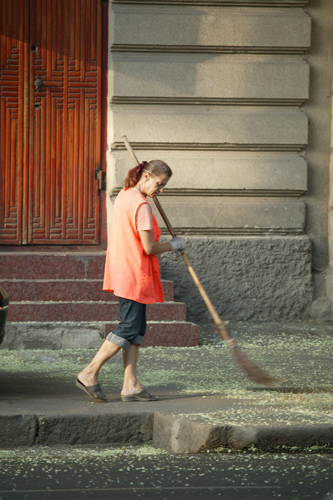
Remember that ethnic markup that I described earlier on? Well, somehow that mixing of genes resulted in the hottest women on the planet. Odessa is still the city of super hot women. This brings a large contingent of sex tourists and mail order (in this case – cash and carry) bride seekers. I was approached (probably because I was typing away on a laptop) by a most distressed gentlemen in a cafe: he could not get online. His hands were shaking. I fixed some gnarly windows crud setup options and wi-fi started working. All he cared about was getting to a dating site, and when it loaded, his hands finally stopped shaking.
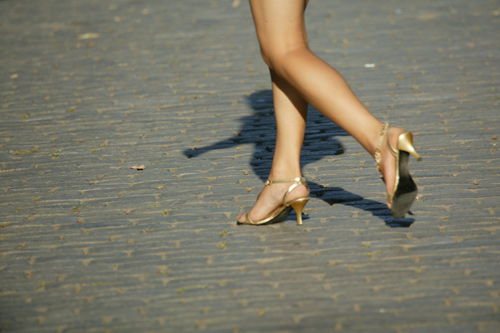
Things have changed though. Odessa took on some qualities of Havana, Cuba. Historic buildings are deteriorating, old cars are kept alive way past what’s reasonable.
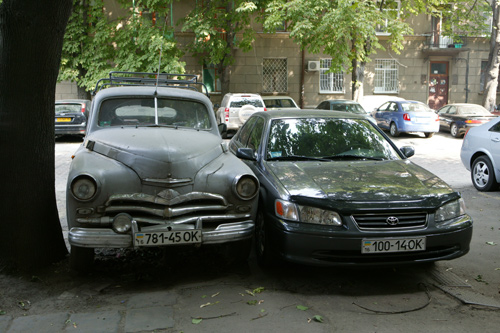
It’s not like Havana because people seem to prosper. Even the pensioners do not go hungry, there is a lot of new construction, and the rich are really, really rich. I’ve seen just about every expensive car I know in the streets, except maybe a Maybach.
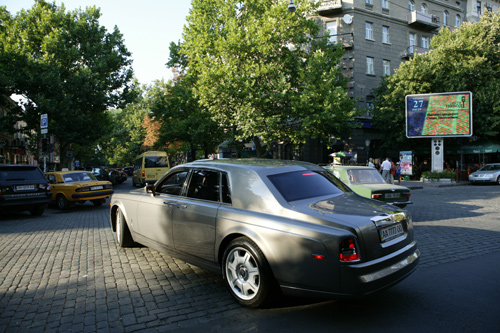
A few things about the new Ukrainian economy. The salaries are paid in US dollars, but dollars are not accepted anywhere. You can easily exchange them into hryvnas and back very easily, and the rate is somehow kept at about 5 to 1, without even having to shop around for a rate.
Real estate is amazingly expensive: for instance the apartment that my parents sold for something like $5K costs about $500K. At the same time the mortgage industry is almost non-existent.
I’m told that the government officials are amazingly corrupt, and they constitute a major portion of the upper crust. A police captain can easily become a multimillionaire, and so can just about any government bureaucrat. There’s a practice of “otkat” – kickback from a government project is rampant. High ranking policemen and bureaucrats are almost outside the law, like in India.
At the same time, even with all the corruption and bribery, the economy is pretty healthy, even without Russia’s oil.
Price-wise Odessa is not the bargain that it once was. For most things I’d estimate the cost of living at about 60-70% of Brooklyn prices. Food and rent is pretty cheap, but electronics, clothing and cars are more expensive. In particular, cars are taxed so much that they cost about 2 to 3 times more than in the US, which makes all those Rollses that I’ve seen even more impressive, and explain the Soviet-era cars.
Deadprogrammer Visits Odessa : Part II : Balconies and Yards.
I Blame the Politicians
Subway is my favorite mode of transportation. Over the years I’ve seen many, many things: from a homeless, running around batman-like, dressed an a garbage bag superhero costume to a girl riding home with a pot containing a huge pot plant.
This morning I looked I was finishing the last Dortmunder book remaining on my bookshelves. Sitting next to me was an older man, who could be best described as having the “hangdog look” ala master thief John Archibald Dortmunder. All of a sudden he started taking off his shirt. He took out a fresher blue shirt out of his bag and started to put it on. A black lady sitting across from him gave him the dirtiest look she could muster.
When the old dude went for his belt buckle, the same lady stomped her feet a couple of times and in a profanity-laced monologue informed him of inappropriateness of his actions. It was a good call – it’s very possible that he was planning on changing his underwear.
The unapologetic old codger replied with a tirade (also profanity-laced), in which he blamed the politicians for making a 50 year old man work (retirement age in the USA is 65). His opponent noted that it’s possible that his habit of using MTA trains as a dressing room hinted at the root of his problems in life, i.e. lack of common sense.
You can see my older subway-related articles here.
Nautical Nonsense
The ship named after the patron saint of bug fixing (her portrait hangs in my cubicle) is in the news for being buzzed by Iranian Revolutionary Guard boats. She could have of course harpooned their ass, but those things are like $700K.
Since the last time I compiled the list of megayachts, Larry Ellison’s very pretty 452 foot yacht slipped to 5th place according to Wikipedia’s list. My advice to the various oligarchs: private nucular submarine is the way to go. Man, do I wish I could afford a 27 foot fishing boat…
Obamarama
Barack Obama’s midichlorian count is off the charts, although not as high as Randy Pinkwood’s.

gPhone
So, Google announced what we are going to get instead of the gPhone. This is a bit like getting $1000 towards college education instead of that hot new toy for your 12th birthday.
This is excellent news, of course. I really hope this will force the evil cell phone companies in the US to either change for the better or go out of business.
I spent a week in the Ukraine, and experienced what the cell phone experience is like in the rest of world. I purchased a very nice new Nokia phone for about $60, activated a SIM card that came with it and immediately received a phone number. It came with enough credits for 100 minutes of non-time-of-day restricted conversation. Later I was able to purchase cards with scratch-off code on just about any street corner that refilled my minutes at very reasonable prices. The competition is fierce and prices are good because you can change phones and SIM cards at will. Phone calls and SMS messages in the Ukraine were very cheap, and even calls to the US were only about 25 cents per minute.
On the other hand, Verizon, my provider of choice, increased the length of my contract just because I added a single handset, added extra data “services” to my plan without checking with me just because my phone supports them, made using activation of a third party handset a 4 hour rigmarole, not even counting all the time that I have to spend on the phone with them just to make sure that they are not overcharging me. I hate Verizon so frickin’ much, but at least they have enough towers in the city to actually allow to use my phone to, you know, conduct whatchumacallit — phone conversations. Ironically, the usually more reliable SMS messages are dropped or delivered days late with them.
They are the Same Kind of Rockets, Really
In my estimation, for every wonderful dream that I get about flying into space I get 5 to 10 horrifying dreams about nuclear war. Also I relatively frequently bump into Rupert Murdoch and Geraldo Rivera but never Matt Groening or Darren Aronofsky.
Rockefeller Center Wardrobe Malfunction
It’s now my 7th year working in the Rockefeller Center. I’ve been walking in it, around it and under it almost daily. Little by little the place opens its little secrets to me – a hidden restaurant here, an eccentric pigeon enthusiast or a subterranean piece of art there.
I used to walk around the place with my camera in hand, like a tourist. Now I am a bit more like the dozens of professional photographers that inhabit the place (Rock Center is home to many news agencies), as my camera is a little nicer. With the nicer gear I get to see smaller details.
John D. Rockefeller Sr., a very strict Baptist, did not approve of drinking and dancing. His son, John D. Jr, was a little less strict — there was dancing at his wedding, despite his father’s wishes (although still no booze). A lot of people think that John D. Sr was the one who built the Rockefeller Center, but you just need to look around the place to realize that Senior probably did not even set foot in it: the architectural art features dozens of naked or half-naked men and women.
For instance, Radio City Music hall features three beautiful metal rondels designed by Hildreth Meiere. These have more exposed nipples than a dosen Superbowls.
The one depicting “Drama” hides, what I guess is a little joke by Oscar Bach, the metalsmith who executed Meiere’s design.
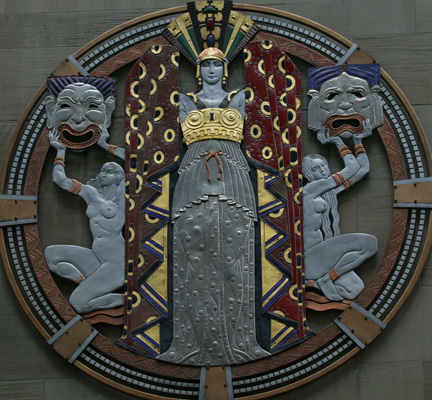
The maiden on the right is sporting a piece of nipple jewelry in a form of an old fashioned slotted screw:
